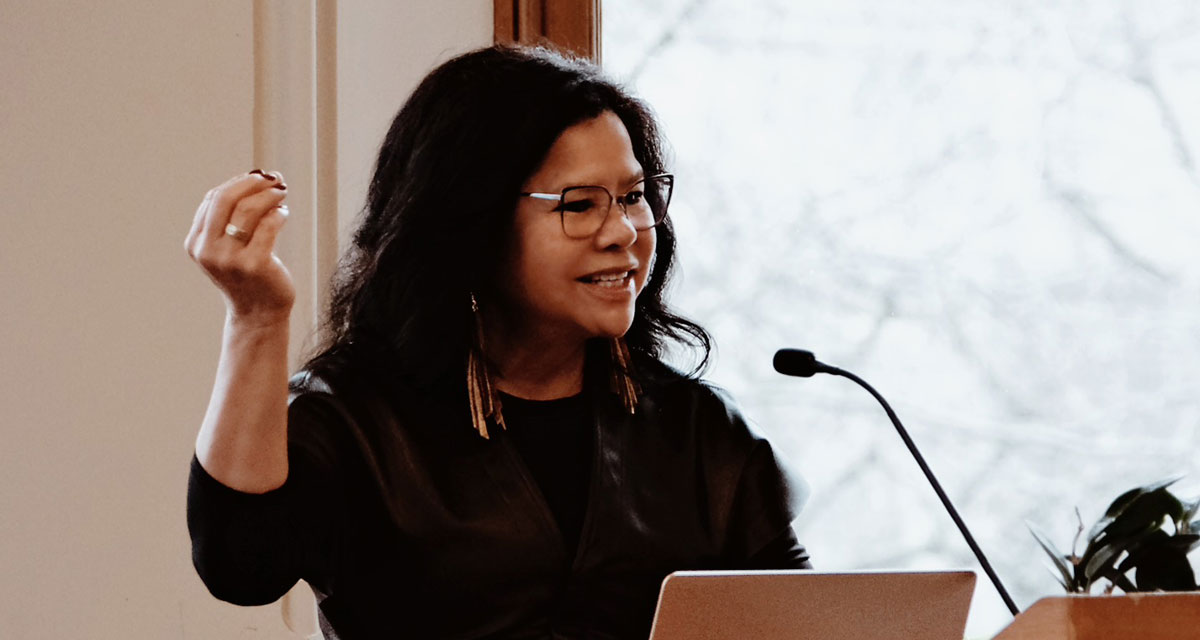What Have Universities Done 10 Years After the TRC Report?

Dr. Jacqueline Ottmann, president of the First Nations University of Canada, delivered a keynote on the roles Indigenous and non-Indigenous peoples must play in reconciliation. (Photo by Cher Yan)
By Samantha Chater
Canadian universities have made progress implementing the 2015 recommendations of the Truth and Reconciliation Commission, but more needs to be done, Victoria University's annual Campus (Re)Conciliation conference was told.
Forty-two Canadian universities have developed Indigenous strategic plans —40 since the TRC report—"which is a testament to its impact," said Jean Becker, an elder and associate vice president of Indigenous relations at the University of Waterloo.
However, less progress has been made on other recommendations, such as the TRC's call for universities and colleges to create degree and diploma programs in Indigenous languages, she said.
"Currently, at the University of Waterloo, we only teach one, so I don't think that call has been met yet," she told the ninth annual Campus (Re)Conciliations: Indigenous Issues in Higher Education Conference organized by the Office of the Dean of Students.
In her remarks, Kelley Castle, dean of students at Victoria University, emphasized the importance of creating spaces for open dialogue.
"The conference is always a place for tough but genuinely rewarding discussion," said Castle. "It's a perfect example of why we need to have the difficult conversations the university has encouraged this past year."
Becker also addressed the ongoing challenge of Indigenous faculty representation in academia. Despite efforts, many institutions are struggling to attract and retain Indigenous scholars.
"At the University of Waterloo, we've grown our Indigenous faculty from one in 2018 to 12 today," said Becker. "But scaling this has been slow and complex. We currently have 12 open positions for Indigenous faculty and we're facing significant challenges in filling those roles, particularly in engineering, mathematics and science."
Dr. Jacqueline Ottmann, one of only two Indigenous university presidents in Canada, discussed the distinct roles that Indigenous and non-Indigenous peoples must play in the path to reconciliation.
"Indigenization is a healing force that must be led by Indigenous peoples because of the importance of the lived experience and knowledge," said Dr. Ottmann, president of the First Nations University of Canada, a federated college of the University of Regina. "Reconciliation is a challenging force that confronts demeaning and divisive policies and that's a collective responsibility."
Ottmann said higher education institutions need structural changes and must move beyond symbolic gestures and take concrete steps toward Indigenization.
"We're asking universities to rethink their structures, their policies and their approaches," said Ottmann. "Change and learning take great humility, as there is unlearning that needs to happen."
Douglas Sanderson, a professor who holds the Prichard Wilson Chair in Law and Public Policy at the University of Toronto's Faculty of Law, was asked about the "land back" movement, the Indigenous-led movement to reclaim stewardship over traditional lands and ecosystems, protecting them for future generations.
Sanderson said the call of land back is "simple, snappy and captures my rage, but it also ends conversations."
"What we should be talking about is jurisdiction, which is about control over land, who gets to make laws and who gets to decide what happens on the land," he said, adding that jurisdiction is a conversation about land that we can have.
The conference concluded with a lively panel discussion on the importance of Indigenous spaces on campus and a presentation from U of T student and artist MJ Singleton. Singleton created a piece featuring Old Vic and it is now the key art for the Campus (Re)Conciliation conference. She currently has another artwork featured in Reflections on Art & History at Victoria College, located in the foyer of Old Vic.
"As an artist, this is what reconciliation is about —coming together, sharing stories and creating something together," said Singleton.
